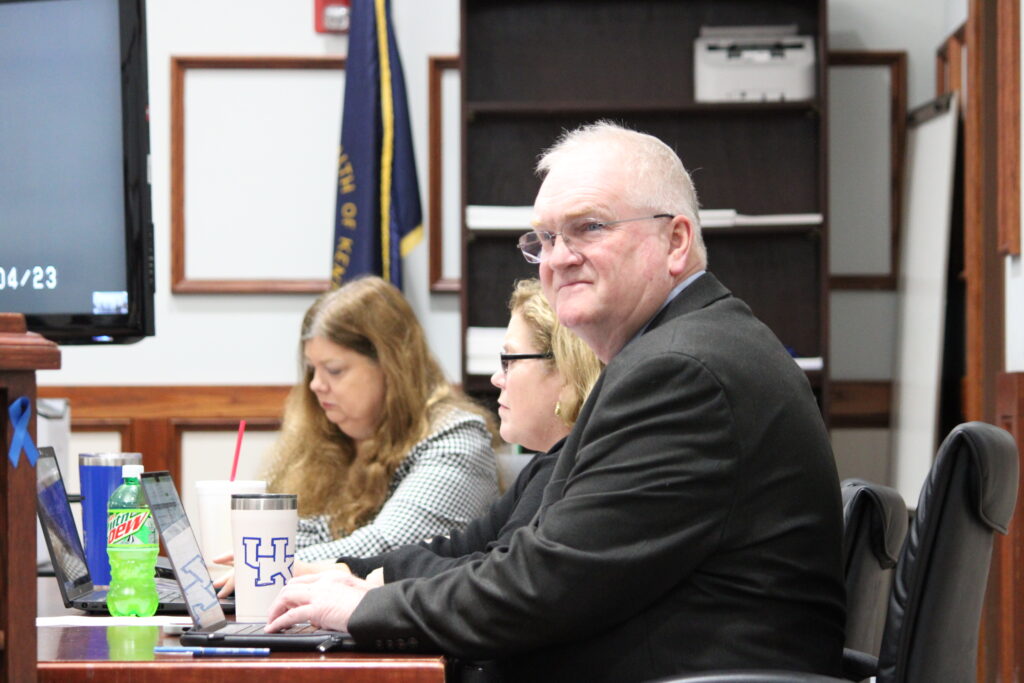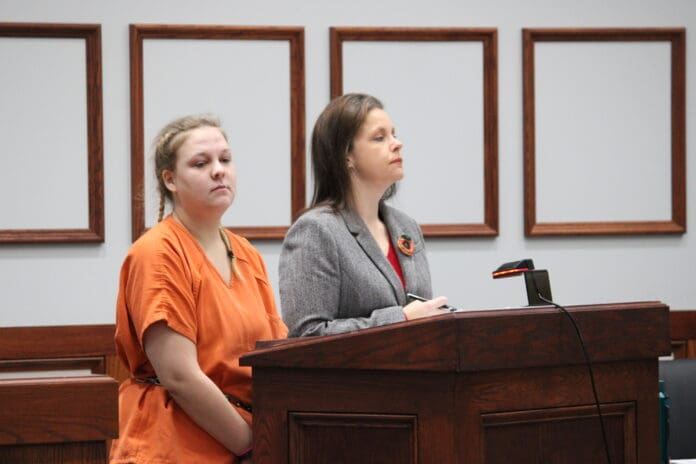MURRAY – On Wednesday, Calloway Circuit Judge Andrea Moore ordered that the Commonwealth’s case against Chyanne Niemeyer on charges of murder and first-degree child abuse brought in connection with the death of her daughter shall proceed after finding her competent to stand trial.
On Oct. 23, 2023, Niemeyer, 26, and her fiancé Nathaniel Gibson, 22, both of Murray, brought Niemeyer’s 17-month-old daughter to the Murray-Calloway County Hospital emergency department after finding her unresponsive, according to the uniform citation. The girl had severe burns covering the majority of her body, which the couple purportedly said were caused by scalding bath water. Deeming the injuries suspicious, ED staff contacted the Murray Police Department. Shortly after the detective arrived, the toddler was pronounced dead.
Niemeyer and Gibson were arrested that night and charged with murder and first-degree criminal abuse, child under 12 years of age. They pleaded not guilty the next day in Calloway District Court, and their bonds were set at $500,000 cash. The grand jury upheld the charges when it indicted the couple in mid-November.
The first suggestion of potential intellectual disabilities came in early November when Niemeyer’s attorney, Directing Attorney for the Department of Public Advocacy Murray Trial Office Cheri Riedl, filed a motion requesting that the grand jury be shown, among other things, a 2011 psychological evaluation that documented “her extremely low intellectual and adaptive functioning.”

Niemeyer and Gibson were arraigned in Calloway Circuit Court on Dec. 4, 2023, but in the interim, Riedel filed a notice questioning Niemeyer’s competency to stand trial, which meant that criminal proceedings against her could not progress until Moore ruled on the issue of competency. While Gibson was arraigned that day, as her co-defendant, his case has also been stalled.
At the time, Commonwealth’s Attorney Dennis Foust told The Sentinel that his office would request its own evaluation be conducted at the Kentucky Correctional Psychiatric Center (KCPC), saying, “If they’re going to raise competency issues, then … we’re gonna have to have an evaluation also.”
The legal standard for determining a defendant’s competency to stand trial, as established in 1960 by the United States Supreme Court in Dusky vs. United States, is to prove by a preponderance of evidence that the defendant has both a factual and rational understanding of courtroom proceedings and is capable of consulting with counsel.


Niemeyer was admitted to KCPC for 19 days in April 2024 and, during that time, was evaluated by Dr. Susan Brittain-Seitz (Brittain), a psychologist at KCPC with more than 15 years of experience in forensic psychology.
“She was very friendly, had a very bright, positive emotional expression,” Brittain said of Niemeyer during the competency hearing, which was originally set in December but, due to scheduling conflicts, was postponed and did not take place until March 10.
“I would say that she was very energetic,” she continued, “and at times, she related to me in a more casual-than-would-be-expected manner and was somewhat childlike. That’s how I would characterize her.”
The defense’s expert Dr. Rivka Olley, a licensed psychologist in Maryland and certified school psychologist with 30 years of experience in the field, conducted her evaluation in July 2024. Similar to Brittain, she described Niemeyer as “exuberant” and “childlike.”
Brittain used the Wechsler Adult Intelligence Scale (WAIS), which directly measures intelligence and cognitive ability, and found Niemeyer to have a full-scale IQ of 58. Brittain explained that the test is broken into four indices, and all of Niemeyer’s scores clustered in the extremely low range or at the lower end of the borderline range, which is consistent with an intellectual disability.

Both experts used the Test of Mental Malingering (TOMM) to determine if any observed impairments were legitimate, and neither found evidence that Niemeyer was feigning a disability. Both also assessed her cognitive abilities, though they took different approaches. Regardless, the results were consistent with Niemeyer falling within the range of someone with a mild intellectual disability.
Olley could not administer WAIS to test Niemeyer’s cognitive ability because Brittain had just used it three months prior, so she chose an academic achievement test known as the Woodcock-Johnson IV Tests of Cognitive Abilities, which Brittain called a “wise choice” because it includes a general intellectual ability index, and the WAIS was contraindicated.
On the Woodcock-Johnson, Niemeyer returned a general intelligence assessment score below 40, which is in the “very low” range. One feature of the assessment is that it associates scores with age equivalents. Niemeyer’s scores placed her on par with a six- or seven-year-old child; she was 25 years old at the time.
“What really affects her the most is … her fluid reasoning,” Olley testified and explained that fluid reasoning is critical for processing information. “Her fluid reasoning was at an age equivalent of six years, six months. So, she is going to pick up some of what you’re saying, but she’s not going to pick up higher vocabulary. She’s not going to pick up the nuances in the information. She’s not going to get a lot of information quickly when it’s presented to her.
“She’s a little stronger in her short-term memory, but it still puts her at a seven-year-old level. … Unless it’s information that’s repeated and repeated and repeated daily and weekly over the years, that information she may have. You give her new information and ask her about it a day later, she may not remember very much of it.”

“Can you opine for the court as to how you believe that would affect Ms. Niemeyer in a criminal trial?” Riedel asked.
“Thinking about how a trial goes, there’s a lot that goes on,” Olley replied. “Now, she did say that she watches a lot of ‘Law & Order’ kinds of TV shows, so she has some understanding of how courts work because there’s always that part where the prosecuting attorney and the defending attorney and the judge are there – she understands those basic roles – what is being said may be above her head.”
She further advised that Niemeyer’s ability to understand would depend not only on the words used but also the pace of speech. Olley testified that it would be necessary to stop frequently to ask if she understood and to fill in what she did not.
“Based on all of her testing through all the years, she’s going to have difficulty,” she added, “especially with words that are above her level and nuanced words.”
Riedel asked if Niemeyer’s ability to repeat information is indicative of her understanding of what is being relayed, and Olley replied, “No, it’s just asking, ‘Can she remember this information long enough to give it back to you?’ If I were to go back a day later, she would not. Things that she’s exposed to over and over and over again, like how (to) turn on a stove, those (are the) kinds of tasks she’s going to remember because she’s been exposed to them all of her life.”
Olley’s evaluation included looking at records of formal assessments going back to the first time Niemeyer was administered the Wechsler Intelligence Scale for Children (WISC) in 2009, when she was nine years old, in addition to school records, which indicated Niemeyer was held back “several times” before she entered first grade.
“So, she was struggling from the get-go,” Olley said. She noted that Niemeyer attended classes for students with intellectual disabilities throughout school and, in high school, participated in a “life skills” program, which, Olley explained, is a curriculum designed to teach students with intellectual disabilities and significant learning deficits how to live independently.
All of the assessments Olley reviewed as well as the ones she conducted produced consistent results “across the board,” she said and noted that the results on the Vineland Adaptive Behavior Scales she administered in July to assess Niemeyer’s adaptive functioning abilities were consistent with results obtained by another practitioner in 2011, who used a different instrument to assess adaptive functioning.

Olley also spoke to Niemeyer’s family members, including an extensive conversation with her mother. During the hearing, she explained that seeking insight from family members is critical, particularly for someone with “significant limitations” like Niemeyer, because “it’s the family that knows the person the best. They’ve been with that person most of that person’s life. They see, day-to-day, what kind of help she needs.”
Family members completed assessments for Olley as well. They rated her receptive language abilities on the level of a two- to three-year-old.
“So, you can imagine what’s happening in a court setting,” Olley said. “How much can she actually understand? But again, it’s always important with people with mild intellectual disabilities to understand that sometimes she’s going to understand more than others, even with her limitations. Her expressive language is also low.”
Brittain did not administer any tests that provided an age equivalent; however, she did give Niemeyer a wide-range achievement test that assessed word recognition and reading ability, which put her at an academic grade level equivalent of 6.6, which would be sixth grade.
“It’s important that we focus on, as I mentioned earlier, functional capacities and any functional impairments to those capacities for competency,” Brittain said during Riedel’s cross-examination. “So, in terms of determining competence, I’m not sure that a picture of a grade equivalent or an age equivalent tells the whole story.”
“But you would agree that both you and Dr. Olley found her to be an individual, functioning at far less than approximately 25 years old at the time, correct?” Riedel asked.
“You know, I did not have a lot of direct observation of her,” Brittain replied. “I also know that she was living with a paramour (Gibson), I believe, and so she was living semi-independently. I do have some data that would conflict with that, so I can’t believe that I agree with that characterization or that I can simplify it to ‘she is functioning as less than a 25-year-old’ because I feel like there is a breadth of information that’s being lost if we reduce it to that.”
Brittain did not speak to any of Niemeyer’s family directly, but the evaluating social worker conducted an interview with Niemeyer’s mother. Brittain said that she relied mostly on progress notes from Niemeyer’s psychiatrist at KCPC, Dr. Eric Lesch, as well as the social worker’s notes “because that is where the wealth of information was.”

She also reviewed court records along with records from Four Rivers Behavioral Health, several school psychological evaluations, Social Security Administration records and Niemeyer’s individualized education plan (IEP) from the Macon-Piatt Special Education District in Decatur, Illinois.
Brittain’s opinion was heavily influenced by Niemeyer’s scores on the ECST-R (Evaluation of Competency to Stand Trial-Revised) assessment, which was specifically designed to assess a defendant’s competency to stand trial pursuant to the three prongs established in 1960 by the United States Supreme Court in Dusky vs. United States: factual understanding of courtroom proceedings, rational understanding of courtroom proceedings and consult with counsel. Additionally, it includes scales to assess feigning.
On direct examination, Foust wanted to know about Brittain’s conversations with Niemeyer about the legal system, both conceptually and about her case, specifically. He asked if Niemeyer demonstrated a basic understanding of how the legal system works.
“Yes,” Brittain said, “when we were discussing the roles of key courtroom members, she did appear to understand the opposing motivations of the prosecution and defense. She understood the role of the judge. … I asked her what she should do if she does recognize that a witness is telling a lie, and she knew that she should tell her attorney if that were the case.”
Brittain concluded that Niemeyer has a rudimentary understanding of the legal system that “allows her to appreciate the nature of what’s occurring in the courtroom.” When asked if Niemeyer seemed to understand her attorney’s role in the process, Brittain said that Niemeyer “appeared very allied” with Riedel.

“In fact, she told me that, as far as her attorney goes, that, even though other inmates had talked poorly perhaps about her attorney, she thought that her attorney was excellent,” Brittain elaborated. “… I can say that she, despite perhaps the jailhouse talk that she referenced, knew and mentioned that her attorney was good and understood that her attorney was skillful. … The comment that she made, I think, speaks to an ability to recognize her attorney’s expertise.”
Foust also inquired about Brittain’s process in determining whether someone has the functional capacity to understand the nature of the crimes against them and if they can rationally participate in their own defense.
“In Ms. Niemeyer’s case,” Brittain replied, “she does have a mild intellectual disability, but that is not something that can be reflexively translated into incompetence. … So, what you have to do is work with the individual and illicit what their skill level is in terms of their ability to relate to their attorney and consult with counsel, their ability to appreciate the facts of their case and appreciate the charges and potential penalties against them and finally their ability to make rational decisions based on that information and rational, self-interested decisions based in reason. And so, when somebody does that, … it’s my opinion that that individual would meet statutory criteria for competence.”
During cross-examination, Riedel asked Brittain about her assessment of Niemeyer’s memory abilities.

“In the forensic interview, certainly, her understanding, as I mentioned, of a plea bargain was very concrete,” Brittain explained, “and I provided some instruction to her during the forensic interview about a plea bargain and how it would be required to enter a guilty plea and the mechanics of it and the purpose of it. And after about a two-hour interval, we had a lunch break, and when she came back, she had (retained) that information; so, there’s just one small piece of data there.”
Brittain added that, while she did not formally assess Niemeyer’s memory, the IQ test she administered included a working memory index, which looks at the subject’s ability to manipulate information and store it in short-term memory. She reported that Niemeyer scored at the uppermost end of the extremely low range on that scale, adding that “she actually performed, I would say, fairly well, given the confines of her intellectual disability in that area of working memory.”
“Your conclusion, then, is that, based on a two-hour ability to recall, that goes into the ‘competency column.’ Is that fair?” Riedel asked.
“It is data that would weigh on the side of competence in my opinion,” Brittain responded, acknowledging Riedel’s point that she did not assess whether Niemeyer retained the information beyond that afternoon. “But she did show some short-term retention and resistance to memory decay of that information with me, which suggests to me that she can learn it, at least, in the here and now, and I do believe that that’s a datapoint that would go toward competence. It certainly wouldn’t support incompetence.”
In addition to the mechanics of a plea deal, Riedel asked Brittain about the education she provided on other topics that were also discussed in her report, including the difference between a bench trial and a jury trial, the role of the judge in a jury trial and the requirement of a unanimous for a guilty verdict.

“I’m curious about the administration of the ECST-R,” Riedel said. “Is it commonplace, is it protocol to educate or to try to teach the subject the concept if they appear to not understand it at first? Is that the protocol for the examiner to try to explain it to the person? Why doesn’t it just stop with, I don’t know’?”
“It’s my practice to certainly attempt to teach and to try to gauge retention,” Brittain answered. “That’s how I can get to the issues whether or not an individual can keep up in court and whether or not they can understand and appreciate the charges and retain that information later. So, it’s my practice, if I am going to do a thorough evaluation, I have to probe and also see if they can retain information that they’re given.”
Riedel quoted Brittain’s report, saying that Niemeyer “correctly identified the best possible outcome of her legal situation, which amounted to something like dismissal, but then, when asked about the most likely outcome for her legal situation, she provided perhaps an overly optimistic estimate initially but, with further inquiry, discussed a more plausible outcome.”
“My concern,” Riedel said, “is that she may have changed her answer in that particular conversation, to that kind of questioning to be, I don’t know, more pleasing to the person that she was conversing with because they were leaning that way.”
“Yes,” Brittain responded, “and I would say that there was an element of eagerness to please when it comes to Ms. Niemeyer. So, perhaps she recognized that she had provided an answer that was inaccurate based on my reaction, but the fact was she was able to recognize that.”
After cross-examining Brittain, Riedel called Olley to testify on rebuttal. She asked the doctor if she had any concerns regarding Brittain’s testimony about educating Niemeyer on topics when she indicated a lack of understanding.
“The concern I would have is if you start educating, she’s going to want to please you,” Olley said. “… That’s one of the key factors in mild intellectual disability. They know that they have a disability. They know they are not like some of the other people – whether it’s in school or when they’re adults – and they don’t like looking different or being different or being seen differently.”
“Based on what you just heard in testimony and your review of Dr. Brittain’s report,” Riedel asked, “… did you feel like that had anything to do with the results Dr. Brittain testified about, specifically as to the ECST-R?”
“Yes,” Olley replied. “What she did was to kind of regroup herself and think, ‘OK, this is what this person wants, so let me go with that.’ … Because that cloak of competence – that she knows that she is not doing as well as others academically; she’s not had a job that she can go out and get and keep; and all of the other things that she’s not capable of doing; she’s very aware of that – she wants you to think she can do more. So, if you give her a piece of information, she may regurgitate it to you but have more difficulty applying it herself in the future.”

With counsel having no further questions for the experts, closing arguments began, starting with the defense. Riedel first reiterated that both experts found no evidence of malingering and that they were in agreement as to Niemeyer’s mild intellectual disability.
“Where Dr. Olley went further and gave a more holistic picture and opinion to the Court,” Riedel said, “was she focused on adaptive functioning in that, to the extent that Chyanne can do some adaptive functioning, like taking care of personal hygiene, doing chores around the house, being able to make herself something to eat, to the extent that that plays into competency is, I think, where these two experts differ.”
About Brittain’s findings on the ECST-R, Riedel said, “My concern that I want to highlight for the court here is that education had to be administered to Ms. Niemeyer on some pretty key points … which, to the doctor, she appeared to understand. I don’t know that ‘appearing’ to understand is really a good evaluation to the court when it’s followed up by the fact that – and she mentioned to both evaluators that – she has had a pretty wide exposure to courtroom dramas on television.
“To the extent that she knows anything, I think it is because she has watched television; and so, she knows the basic principles of a judge and jury and defense counsel and prosecution, and she can identify that they’re adversarial – the defense and prosecution – but I do think that nuance and more specific detail and more abstract thinking really needs to be considered when you’re talking about whether or not someone is competent to stand trial. Because you’re not only talking about whether someone is competent to stand trial, you’re talking about whether they’re competent to make a decision about what to do in their case.”
Riedel was clear that she was not expressing an opinion about the outcome of Niemeyer’s case before saying, “when we’re talking about competency to stand trial, we’re also talking about competency about whether or not to go to trial, and I do think that Ms. Niemeyer, despite her best efforts in wanting to appear to be competent – and I don’t mean competent to stand trial but to be of similar intelligence to her peers – I don’t know that she really has the capacity to appreciate the nuances.”
“I have to respectfully disagree with Dr. Brittain; I don’t believe that Ms. Niemeyer has the capacity to do this,” Riedel continued. “Does she have the capacity to repeat something she was told two hours ago? Well, sure, but if we had her talk to you today, would she be able to explain to you what a plea bargain is about. … I think there are things that will happen that she won’t be able to appreciate (if they helped or hurt her case). She is very easily influenced. I think she very much wants to please the person that she is speaking to. She very much wants to believe what she was told last, especially if she thinks it is favorable to herself. I think that can cloud her judgment.

“I think she is a very short-term thinker. … I don’t know that beyond what happens by Friday of this week is something that she can really understand, and I think that’s where the adaptive behavioral analysis that Dr. Olley did is very demonstrative for the court to say that, if she can do these things, it’s only because of repetition.
“… I think she has the right under the law and due process to understand what’s happening in the trial. I think that’s what it means to rationally participate in one’s own defense – they have the right to understand. … Being able to repeat a word in two hours does not indicate understanding; and I think that is what the law requires, Judge.”
“I’m going to be very brief,” Foust said to begin his closing argument. “Everything Ms. Riedel said, I’m not sure that I would be competent to stand trial if that’s the standard. That’s not the law, Judge; that’s not the law.”
He mocked the relevance of Niemeyer’s interest in Law & Order and other court dramas, noting the exposure likely has given her “pretty good” understanding of the criminal justice system.
“Yes, we all agree she has a mild intellectual disability; that’s it,” Foust said, adding that if Niemeyer needed accommodations, that would be decided at the time of the trial. “She’s competent. Nothing that you’ve heard here today leads to her incompetence; and I just ask that you find her competent, and then we’ll go from there.”
Moore praised counsel on both sides for doing well during the hearing before advising that she needed time to review the testimony and the experts’ respective reports before she could enter a ruling.
On Monday, Niemeyer and Gibson were back on the circuit court docket for status hearings. While Gibson was in court for his status hearing, Niemeyer requested to not be present. When Gibson’s case was called, Moore advised that she was still working on the competency order in Niemeyer’s case, but for scheduling purposes, she informed the parties that she found Niemeyer competent to stand trial.

The order on competency was entered Wednesday. In it, Moore gave considerable weight to Brittain’s findings, and although the order did not mention the ECST-R by name, it did reference several conclusions Brittain drew from that assessment.
“It is undeniable that the Defendant does suffer from mild intellectual disability as both Dr. Olley and Dr. Brittain-Seitz concluded,” Moore wrote. “The tests that Dr. Olley administered give an age range performance and it seems Defendant’s scores weigh heavily in Dr. Olley’s opinion regarding competence to stand trial. However, on the other hand we have Dr. Brittain-Seitz who administered four tests and concludes on the total body of findings that despite Defendant’s mental condition, she does have the capacity to appreciate the nature of the proceedings against her and to also rationally participate in her defense.”
Citing Brittain’s report, Moore noted the fact that Niemeyer was able to demonstrate a basic understanding of legal concepts as well as the roles of key courtroom members, that she could identify that she has been charged with murder, that she was able to demonstrate understanding the “adversarial nature of the judicial process” and that she voiced holding a “high opinion of her legal counsel” were compelling.
“What is most compelling is that during the time Dr. Brittain-Seitz spent with the Defendant she appeared to her to have adequate reasoning skills to relate to her attorney during the case and to communicate effectively. What is also very compelling is that the Defendant has exhibited appropriate Courtroom behavior when appearing before this Court in the past.”

Notably, had the ruling gone the other way and Niemeyer had been deemed incompetent, Foust would have been statutorily required to initiate involuntary commintment proceedings against her, under KRS 202C.
Niemeyer and Gibson’s next scheduled court appearances are on Monday, June 9, at 8:30 a.m.
Individuals charged with crimes are presumed innocent until proven guilty in a court of law.




